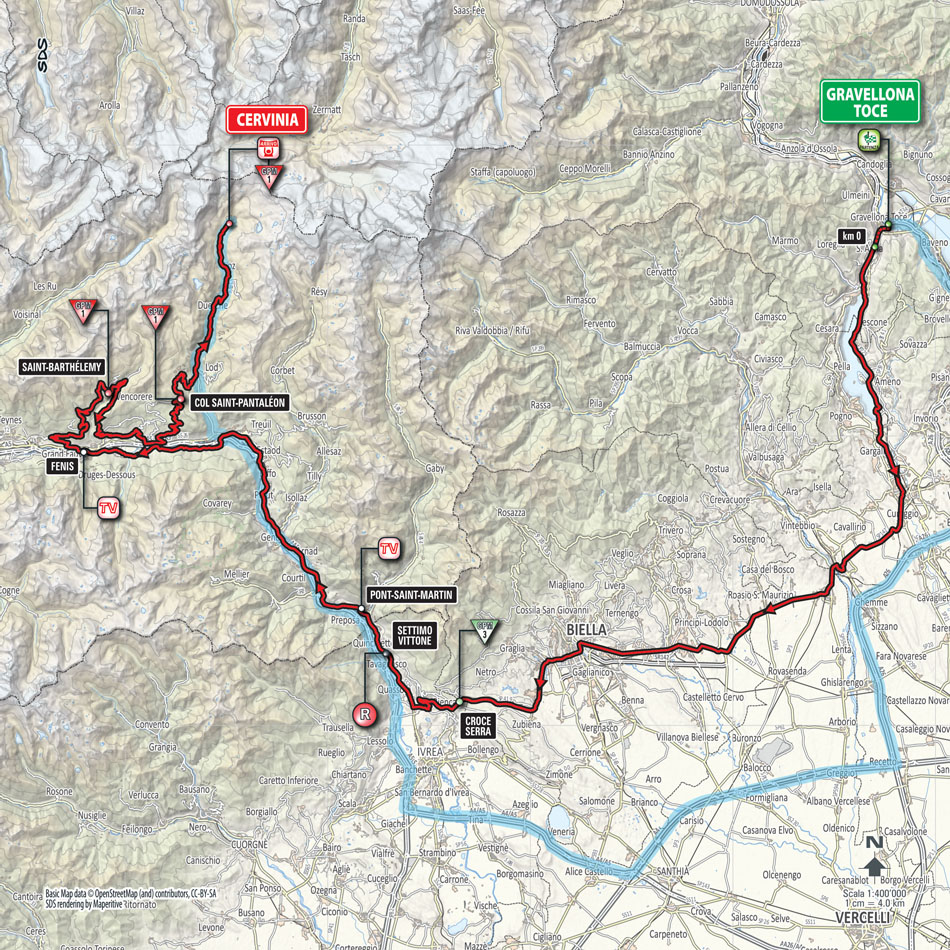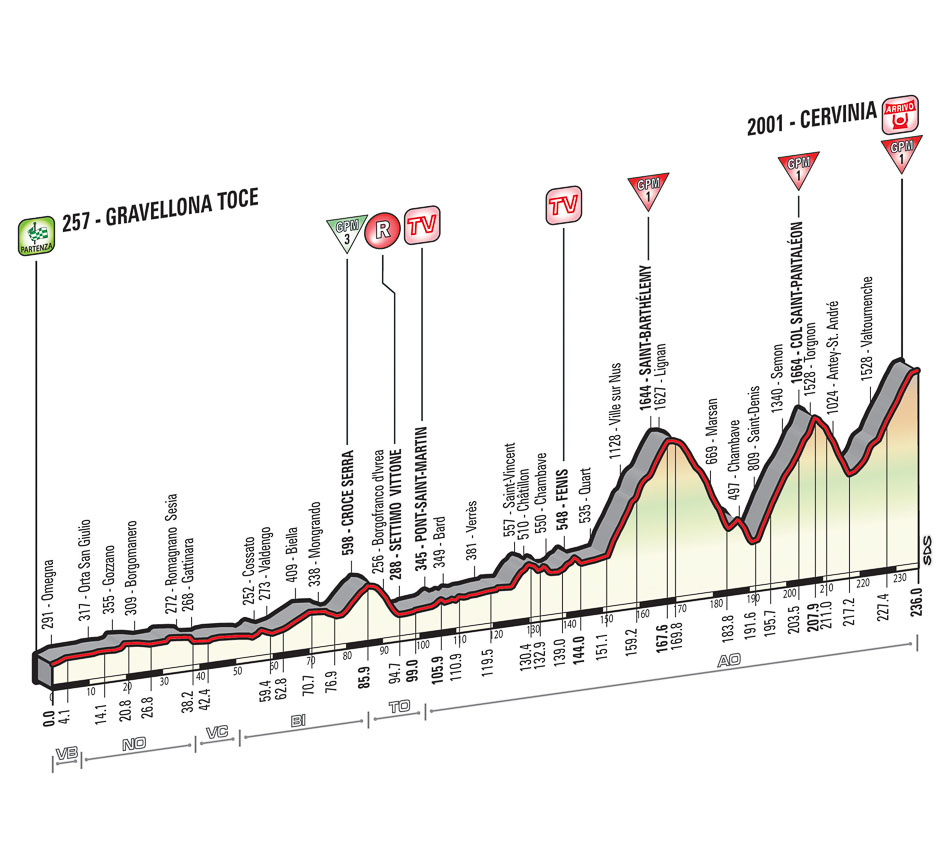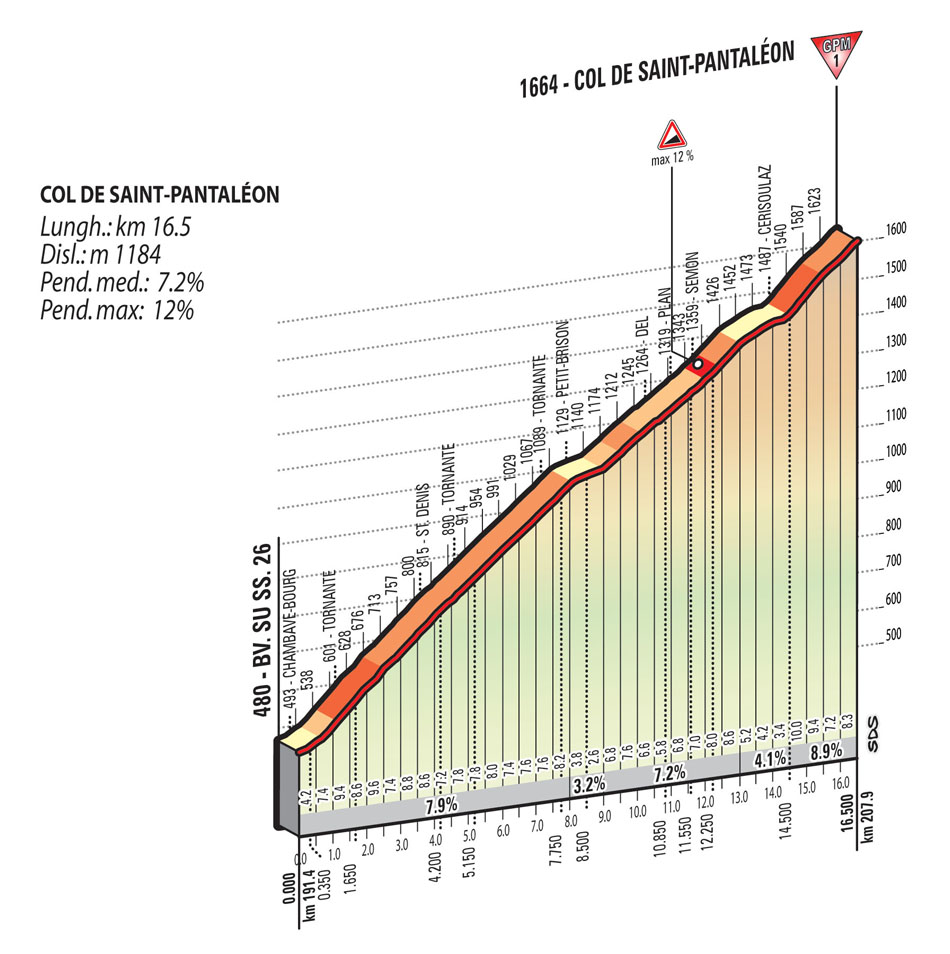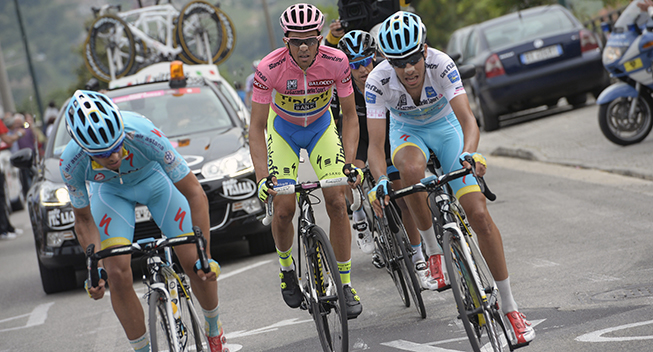Alberto Contador (Tinkoff-Saxo) got his revenge by attacking Mikel Landa in today’s stage and so sent a strong signal to the Astana team. However, the race leader still hasn’t won a stage and he now only has two opportunities left. The first one comes tomorrow in the mammoth 236km stage 19 that is maybe his best chance to avoid getting to Milan with no stage win in his pocket.
The course
As it was the case last year, the race ends with three consecutive stages in the mountains before the final flat stage. After the moderately hard opener, the triptych continues with a brutally tough stage in which the combination of hard climbing, three weeks of tough racing and a long distance of 236km will take its toll. This is the penultimate chance for the GC riders to make a difference and as the finishing climb in stage 20 is pretty easy, it may even be their best opportunity.
The course brings the riders over a massive 236km from Gravllona Toce to a summit finish in Cervinia. This queen stage through the Alps features a total difference in altitude of approx. 4,800 m, that is covered almost entirely over the last 100 km, with 3 subsequent climbs, measuring up to 20 km each. The route winds its long journey around the Alpine foothills through the districts of Borgomanero and Biella with the Croce Serra climb (category 3, 6.9km, 3.8%, max. 9%), and then it enters the Aosta Valley,where the last 150 km of the stage will take place. The stage course tackles the St. Barthélemy ascent (category 1, 16.5km, 6.7%, max. 13%, pretty irregular with a steep start and then several easier sections along the way), St. Pantaléon (category 1, 16.5km, 7.2%, max. 12%, a tougher climb with 3 regular 7-8% sections divided by two easy parts) and, eventually, it ramps up the Cervinia climb (category 1, 19.2km, 5.0%, max. 12%).
The final climb is not very hard. The first four kilometres average 2.5% and then the riders reach 2km with a gradient of 7.2%. Then it’s another almost completely flat section before the riders get to the steepest part, a 1.5km stretch with a gradient of 7.8%. The following 6km are pretty regular at 5-7%. The last kilometres run entirely uphill. The route rises with the steepest slope just before and while crossing the town of Valtournenche. The climb starts to level out gently 3 km before the finish. With less than 2,000 m remaining to go, the average gradient is 1.4%. The 450-m long home straight, on 7-m wide asphalt road, has a 4% gradient. Over the last 6 km, the stage course features two well-lighted tunnels. There are no major technical challenges in the finale as the final hairpin bends comes with 3km to go and then the road is only slightly winding in the final part.
The Cervinia climb has been used as the final ascent thrice, most recently in 2012. Here Andrey Amador, Jan Barta and Alessandro De Marchi made it to the finish in a breakaway and it was the Costa Rican who won the three-rider sprint. Ryder Hesjedal attacked out of the group of favourites to earn 26 seconds but the final climb didn’t do much damage as only very small splits appeared in the 15-rider group of favourites.





The weather
After the rainy second part, the riders have again had a taste of the summerlike conditions that characterized the first week. In the final weekend, they may get a bit of rain again but hopefully it will stay dry for stage 19. There should be a bit of sunshine at the start but as the day goes on, it will get cloudier and there will be a risk of a small shower. It will be pretty cold as the temperature at the finish will only be around 2 degrees.
There will be a very a light wind from a southwesterly direction which means that the riders will have a cross-headwind in the first part of the stage. After the first climb, they will turn into a crosswind and then there will again be a cross-headwind before the riders reach the serious climbing. There will be a tailwind on the first two climbs and a headwind and cross-tailwind in between. There will be a cross-tailwind on the descent from the penultimate climb and on the final ascent.
The favourites
The GC riders were always expected to test each other on the Monte Ologno but few would have expected the kind of drama that allowed Alberto Contador to extend his lead. The Spaniard may not openly have admitted that it was payback time after Astana attacked him in the queen stage but there is no doubt that he was strongly motivated to send a signal to the Kazakh team.
From a GC point of view, it was a great day for Contador as he managed to extend his overall lead and if anyone had just the slightest doubt that he would be able to defend his advantage – if he avoids bad luck of course – those doubts must now have been put to rest. However, his big performance didn’t allow him to win the stage as his team had decided not to chase down the early break – a wise decision as this stage was never one that he was going to win.
In the early part of the race, the early breaks decided the mountain stages but after we have reached the high mountains, the racing has been very controlled. Tinkoff-Saxo are in search of a stage win for Alberto Contador who doesn’t want his Giro win to lose esteem due to the fact that he gets to Milan without a single win. He now only has two opportunities and it will be interesting to see how much effort he wants to put into an attempt to take that elusive victory.
In the press conference after stage 17, he again underlined that a stage win takes less priority as he needs to keep the Tour de France at the back of his mind. The racing in the Giro has been harder than he would have liked and he needs to keep something in reserve for the battle in July.
However, it more seemed like a case of trying to prepare the press for the possible scenario that he will ride into Milan without that elusive stage win in his pocket. The racing in the first two mountain stages does nothing to suggest that he won’t go all in in in his quest to win a stage. In fact, Tinkoff-Saxo have controlled the stages firmly and haven’t given much room for the early breaks.
Contador has two chances left but none of the final two mountain stages suit him very well. As we have claimed several times, the mountain stages in this year’s Giro are all characterized by rather easy final climbs and the hardest challenges have been the penultimate ascents. This means that it is hard for a climber like Contador to make a difference in the finale and he probably needs to attack a bit earlier to win the stage.
The final two mountain stages also have these characteristics. Friday’s stage is hard due to the distance but none of them climbs are very tough. Saturday’s stage includes the Colle delle Finestre which is a brutal climb but the final climb to Sestriere is very easy.
Due to the inclusion of Finestre, there is no doubt that Contador would prefer to win Saturday’s stage but with a harder finishing climb, stage 19 may actually be his best chance. On the other hand, it requires a massive effort to control a 236km stage and it remains to be seen whether he will ask his team to do so.
What makes things slightly easier for Contador is the fact that both stages have completely flat first parts. This will make it easier to make sure that the early break is neither too strong, nor too big, and it will be harder for the very good climbers to join the right move. Furthermore, it will allow him to use his “heavy” guys Christopher Juul and Matteo Tosatto in this part and still keep his climbers ready for the finale.
These two stages are the final opportunities for most of the teams to win a stage and so we will definitely see lots of attacks in the early part and it will probably take some time for the early break to be formed. With a flat start, the luck factor plays a significant role and very often the break is made up of riders who have no chance to finish it off in this kind of finale.
When the break has gone clear, we expect Tinkoff-Saxo to take full control. Contador is so immensely ambitious that he won’t miss an opportunity to win that elusive stage. It may be a very long stage and require a big effort of his teammates but in an interview with Danish TV2, sports director Lars Michaelsen did nothing to hide their intentions. Furthermore, in-form riders like Ryder Hesjedal, Yury Trofimov and Steven Kruijswijk may fancy their chances in a stage whose finale is not too hard and if their teams miss the break, they may lend a hand. Finally, there is always the chance that a team like Bardiani will miss the break and want to give one of their climbers an opportunity in the finale. Of course the break has a chance but the odds are on another stage for the GC riders.
It will be interesting to see what will happen on the first two climbs. In the first part of the race, it has always been Astana taking the initiative but we doubt that they will do so tomorrow. They have probably realized that Landa won’t win the race. Fabio Aru is at risk of losing his spot on the podium and so it could easily backfire on the Kazakh team if they try to make things hard on the first two climbs.
Instead, we may see Tinkoff-Saxo go fast already from the early slopes of the first climb. If Contador wants to win this stage, it has to be as hard as possible. If everybody is relatively fresh when they get to the bottom of the final climb, it won’t be possible for him to make a difference. Hence, they need to go full gas right from the start of the first climb.
They may get some assistance from Movistar. The Spanish team have a great chance to move Andrey Amador onto the final podium as the Costa Rican is clearly stronger than Aru at the moment. Hence, they have a clear interest in making things hard and with their very strong team of climbers, they can make it a brutal day in the saddle.
If those two teams combine forces to make it hard, we will see a gradual elimination on the first two climb and it may be a rather small front group that arrives at the bottom of the final climb. Here the remaining riders will battle it out for the stage win and important time gains in the overall standings. However, it is important to remember that the difference has to be made before the riders get to the final 2km which are almost flat.
It is hard not to be left with the impression that Mikel Landa is the strongest climber in the race. In stage 15, Alberto Contador was clearly at his limit when the Basque made his second attack and when he tried again, the race leader had to surrender. In the queen stage, he seemed to be at ease throughout the entire stage and quickly distanced Contador and Kruijswijk when he went full gas.
Of course it is hard to base too much on that performance as Contador had been going full gas from the bottom of the Mortirolo and had been riding hard on the Aprical ascent. However, Landa was also clearly the fastest on the Monte Ologno today when he quickly made it back to the Aru group.
It is hard to know how Landa was feeling when he rejoined the group. He probably decided to stay with the group as it would be impossible for him to bridge a 1-minute gap alone and it would be better to stay in the group for final section. There is no reason to suggest that Landa was not comfortable and so we put the Basque at the top of the climbing hierarchy.
There is no doubt that Landa and Contador are the strongest and the final climb will probably come down to a battle between those two riders. Landa should be the strongest and even if he is not good enough to drop Contador, he is the fastest in a flat sprint and so must be the favourite to win the stage.
However, it is definitely also possible for Contador to finally get that elusive stage win. While Landa finds himself in untested territory, Contador is a master in recovery in the third week of a grand tour. Everybody knows that the race leader won’t slow down and at this point in the race, Landa may be starting to feel the fatigue. Contador may have been slightly below Landa’s level until now but at the end of a grand tour, he is usually the strongest. To win the stage, he will probably have to ride solo to the finish but that is definitely more than just a distant possibility.
If Landa and Contador are equally matched, the door could open for other riders to win the stage. The riders that are one step below the two best riders may benefit from the tactical battle to make a late attack. Yury Trofimov nearly won stage 15 in this way and it would be no surprise to see a similar move pay off in stage 19.
If that turns out to be the scenario, Ryder Hesjedal has to be the prime pick. The Canadian is always very strong in the third week of a grand tour but this year he is clearly riding at his highest level since the 2012 Giro. His performance in the queen stage was really impressive as he finished sixth despite having been on the attack all day. He is never afraid of attacking and tomorrow it may pay off for him.
Yury Trofimov got so close to the win in stage 15 and he will be eager to make amends. The Russian has taken a massive step up in this race and is riding better than ever. He is clearly not far off the mark of the best riders and he could easily be the rider who benefits from the tactical battle.
The same goes for Steven Kruijswijk who has been so aggressive in this race and really deserves a stage win. The Dutchman was very strong in the queen stage and if he has the same legs tomorrow, he may even be strong enough to follow Contador and Landa. However, he didn’t seem to be at the same level today and it may indicate that fatigue has started to set in. On the other hand, he doesn’t need to be the strongest rider to win the stage if he can time his move well.
Damiano Caruso has been riding consistently well in this race. He has been unable to follow the best but he has avoided any bad days. Today he was never in trouble and tomorrow’s pretty easy finishing climb may offer him a chance to win the stage. Among the GC riders, he is clearly the fastest sprinter and if a small group ends up sprinting for the win on the flat roads in the finale, he will be hard to beat.
Another rider who can win in a similar scenario is Carlos Betancur. The Colombian is clearly getting better and better and he now only has two opportunities left. Today he was held up behind the crash and so he didn’t feature in the finale. However, that allowed him to take it rather easy. This should leave him fresher for tomorrow and he has several cards to play. He was 10th in the queen stage and so he is now strong enough to mix it up with the GC riders. He can both join an early break and use his fast sprint to beat the GC riders.
Andrey Amador won in Cervinia in 2012 and he would love to repeat the performance this time. However, he now finds himself in a completely different situation as he is a GC contender. Tomorrow his main goal will be to move onto the podium but the stage win will also be a possibility. He is clearly one of the best climbers in the race and like Hesjedal, Kruijswijk and Trofimov he could launch a late attack. If that’s the case, he will be hard to catch in the flat finale.
Giovanni Visconti has always claimed that he is climbing better than ever and today he really proved that he is right. He was clearly one of the strongest on the Monte Ologno and he clearly has the shape to win this stage. He has done nothing to hide that he wants to win one of the mountain stages in the final week and he will do his utmost to join the early break. However, he also has a chance against the GC riders as he is no GC danger and has a fast sprint.
Franco Pellizotti has been very aggressive in this race and as usual he is getting better and better. The Italian got close to a stage win in Monte Berico and he has been in almost all the breaks that really mattered. He is not strong enough to win a battle between the GC riders but he knows how to get into the early break. If the escapees are allowed to decide the stage, he will be hard to beat.
Igor Anton had a very slow start to this race but his legs have now finally started to come around. He was really impressive in the queen stage when he helped Contador rejoin the Aru group and there is no doubt that he is now one of the best climbers in the race. With a flat start, it will be hard for him to get into the break but if he is there, he will be a strong contender.
Stefano Pirazzi has been climbing better than ever but surprisingly he has not been in a single break. He rode very strongly in the queen stage and made it clear that he has set his eyes on the final two stages. If he can make it into the right group, he is definitely strong enough to finish it off.
The same goes for his teammate Edoardo Zardini. The young Italian hasn’t really shown his potential in this race and has been far from his best level. Today he finally showed what he is capable of when he helped Landa rejoin the Aru group. Like Anton, it will be hard for him to join the right group in a stage with a flat start but if he is there, he has the climbing skills to win.
CyclingQuotes’ stage winner pick: Mikel Landa
Other winner candidates: Alberto Contador, Ryder Hesjedal
Outsiders: Yury Trofimov, Steven Kruijswijk, Damiano Caruso, Carlos Betancur
Jokers: Andrey Amador, Giovanni Visconti, Franco Pellizotti, Igor Anton, Stefano Pirazzi, Edoardo Zardini
| Marco MARONESE 30 years | today |
| Shane VASQUEZ 45 years | today |
| Amos WOLFF 42 years | today |
| Martin KUBIK 29 years | today |
| Serge HERZ 41 years | today |
© CyclingQuotes.com









